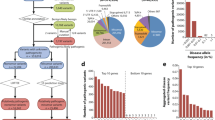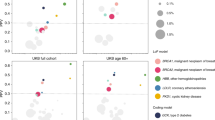Abstract
Numerous genetic association studies for complex diseases are performed. Investigators place emphasis on formal statistical significance (P-values <0.05), but the predictive ability of early statistically significant (‘positive’) findings is unclear. We scrutinized 55 cumulative meta-analyses of genetic associations (579 studies), in order to assess whether having statistical significance in the earliest (first) published study or in at least half among several (⩾3) early-published studies, or high statistical significance in early studies had any predictive ability for establishing or refuting the presence of the genetic association in subsequent research. In 35 associations, a first study was ‘positive’ and in 15 associations more than half of the early-published reports were ‘positive’. The average publication rate of subsequent studies increased 1.71-fold with a ‘positive’ first report. When compared against the summary results of subsequent research, sensitivity and specificity were 0.65 and 0.38 for the first reports, and 0.40 and 0.73, respectively, when at least three early studies were considered. First studies also had poor predictive ability, when we considered the estimated attributable fraction and coverage of the 95% confidence interval thereof or higher levels of statistical significance. We conclude that although ‘positive’ findings in the very first reports provide strong incentive for conducting more studies on a putative genetic epidemiological association, the statistical significance or even the magnitude of the effect of early studies cannot adequately predict eventual establishment of an association. Conversely, many genuine epidemiological associations would be missed, if research were abandoned after early underpowered ‘negative’ studies.
Similar content being viewed by others
Log in or create a free account to read this content
Gain free access to this article, as well as selected content from this journal and more on nature.com
or
References
Zhao Z, Boerwinkle E : Neighboring-nucleotide effects on single nucleotide polymorphisms: a study of 2.6 million polymorphisms across the human genome. Genome Res 2002; 12: 1679–1686.
Reich DE, Lander ES : On the allelic spectrum of human disease. Trends Genet 2001; 17: 502–510.
Ioannidis JP, Ntzani EE, Trikalinos TA, Contopoulos-Ioannidis DG : Replication validity of genetic association studies. Nat Genet 2001; 29: 306–309.
Hirschhorn JN, Lohmueller K, Byrne E, Hirschhorn K : A comprehensive review of genetic association studies. Genet Med 2002; 4: 45–61.
Lohmueller KE, Pearce CL, Pike M, Lander ES, Hirschhorn JN : Meta-analysis of genetic association studies supports a contribution of common variants to susceptibility to common disease. Nat Genet 2003; 33: 177–182.
Goring HH, Terwilliger JD, Blangero J : Large upward bias in estimation of locus-specific effects from genomewide scans. Am J Hum Genet 2001; 69: 1357–1369.
Ioannidis JP, Trikalinos TA, Ntzani EE, Contopoulos-Ioannidis DG : Genetic associations in large versus small studies: an empirical assessment. Lancet 2003; 361: 567–571.
Lau J, Ioannidis JP, Schmid CH : Quantitative synthesis in systematic reviews. Ann Intern Med 1997; 127: 820–826.
DerSimonian R, Laird N : Meta-analysis in clinical trials. Control Clin Trials 1986; 7: 177–188.
Lau J, Antman EM, Jimenez-Silva J, Kupelnick B, Mosteller F, Chalmers TC : Cumulative meta-analysis of therapeutic trials for myocardial infarction. N Engl J Med 1992; 327: 248–254.
Ioannidis JP : Genetic associations: false or true? Trends Mol Med 2003; 9: 135–138.
Colhoun HM, McKeigue PM, Davey Smith G : Problems of reporting genetic associations with complex outcomes. Lancet 2003; 361: 865–872.
Easterbrook PJ, Berlin JA, Gopalan R, Matthews DR : Publication bias in clinical research. Lancet 1991; 337: 867–872.
Dickersin K, Min YI : Publication bias: the problem that won't go away. Ann NY Acad Sci 1993; 703: 135–346.
Ioannidis JP : Effect of the statistical significance of results on the time to completion and publication of randomized efficacy trials. JAMA 1998; 279: 281–286.
Little J, Bradley L, Bray MS et al: Reporting, appraising, and integrating data on genotype prevalence and gene–disease associations. Am J Epidemiol 2002; 156: 300–310.
Ransohoff DF : Rules of evidence for cancer molecular-marker discovery and validation. Nat Rev Cancer 2004; 4: 309–314.
Ntzani EE, Ioannidis JPA : Predictive ability of DNA microarrays for cancer outcomes and correlates: an empirical assessment. Lancet 2003; 362: 1439–1444.
Stroup DF, Berlin JA, Morton SC et al: Meta-analysis of observational studies in epidemiology: a proposal for reporting. Meta-analysis of Observational Studies in Epidemiology (MOOSE) group. JAMA 2000; 283: 2008–2012.
Wacholder S, Rothman N, Caporaso N : Counterpoint: bias from population stratification is not a major threat to the validity of conclusions from epidemiological studies of common polymorphisms and cancer. Cancer Epidemiol Biomarkers Prev 2002; 11: 513–520.
Vieland VJ : The replication requirement. Nat Genet 2001; 29: 244–245.
Lander ES, Schork NJ : Genetic dissection of complex traits. Science 1994; 265: 2037–2048.
Gambaro G, Anglani F, D'Angelo A : Association studies of genetic polymorphisms and complex disease. Lancet 2000; 355: 308–311.
Khoury MJ, Little J : Human genome epidemiologic reviews: the beginning of something HuGE. Am J Epidemiol 2000; 151: 2–3.
Author information
Authors and Affiliations
Corresponding author
Rights and permissions
About this article
Cite this article
Trikalinos, T., Ntzani, E., Contopoulos-Ioannidis, D. et al. Establishment of genetic associations for complex diseases is independent of early study findings. Eur J Hum Genet 12, 762–769 (2004). https://doi.org/10.1038/sj.ejhg.5201227
Received:
Revised:
Accepted:
Published:
Issue date:
DOI: https://doi.org/10.1038/sj.ejhg.5201227
Keywords
This article is cited by
-
Correlating of GSTM1, GSTT1, and GSTP1 genetic polymorphisms with the risk and expressions in children with isolated Hirschsprung disease
International Journal of Colorectal Disease (2011)
-
Molecular genetics of attention-deficit/hyperactivity disorder: an overview
European Child & Adolescent Psychiatry (2010)
-
A primate-specific, brain isoform of KCNH2 affects cortical physiology, cognition, neuronal repolarization and risk of schizophrenia
Nature Medicine (2009)
-
catmap: Case-control And TDT Meta-Analysis Package
BMC Bioinformatics (2008)
-
Using genetic data in cognitive neuroscience: from growing pains to genuine insights
Nature Reviews Neuroscience (2008)



